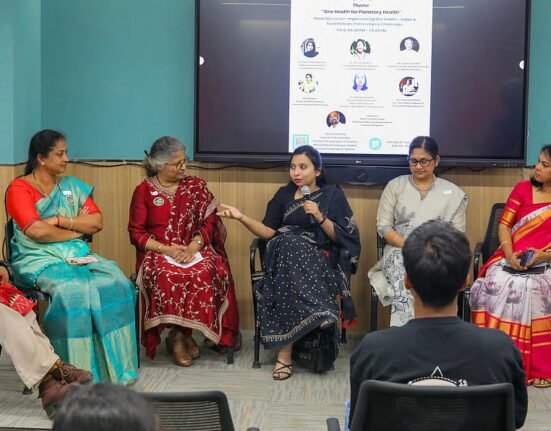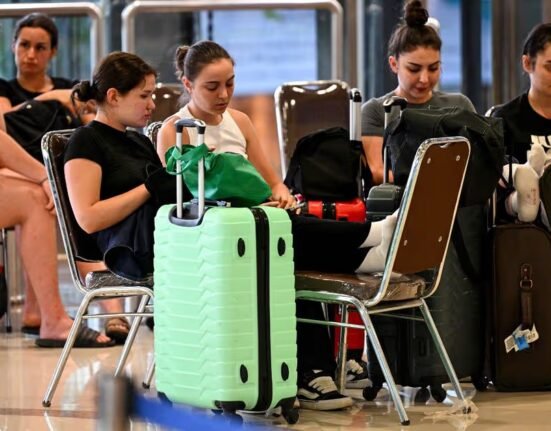Colorado legislators winnowed 13 property-tax bills down to just four during the first day of a special session Monday but put a bill at the center of a governor-negotiated deal on a collision course with a constitutional amendment that could upend that deal.
In the most anticipated hearing of the day, the House Appropriations Committee approved a measure that would expand property-tax breaks passed at the end of the regular session in May and cap annual growth of property-tax revenue for schools and local governments. Passage of House Bill 1001 also would get Advance Colorado and Colorado Concern to pull from the November ballot a pair of more far-reaching property-tax-cut proposals that education and government leaders fear would result in draconian cuts to colleges, Medicaid and local health and safety districts.
House Speaker Julie McCluskie, the Dillon Democrat cosponsoring HB 1001, said proponents of Initiatives 50 and 108 agreed in a letter to yank their initiatives and forego further property-tax ballot measures for six years if the bill passes without major changes. But at roughly the same time McCluskie was announcing that to House Appropriations members, Democrats on the House Transportation, Housing and Local Government Committee were advancing a proposal that could run afoul of that agreement.
House Concurrent Resolution 1, sponsored by Rep. Mike Weissman, D-Aurora, would put a constitutional amendment on the November ballot requiring any future action on property-tax breaks to be approved by local governments. Initiative 50 and 108 backers implied to Colorado Politics last week that passage of the resolution would derail ongoing negotiations and allow voters to decide the fate of the proposed tax cuts.
A special session called because of ballot proposals
McCluskie and cosponsoring Rep. Rose Pugliese, the Republican House minority leader from Colorado Springs, focused solely on advancing HB 1001 to the House floor on Monday. And they succeeded in getting a coalition of moderates and pragmatic conservatives and liberals to do so on an 8-3 vote after a roughly five-hour hearing despite numerous complaints from backers about the negotiations that led to the special session.

Colorado state Reps. Julie McCluskie and Rose Pugliese explain House Bill 1001 to the House Appropriations Committee on Monday.
“I had hoped that Senate Bill 233 would be the compromise we could all hang our hats on, but wealthy interests had other ideas,” said Rep. Kyle Brown, D-Louisville, of the bipartisan tax-break bill passed over the final three days of the regular session. “And I really believe that we have to pass a bill to make sure these terrible measures can be taken down.”
Initiative 50 would cap annual statewide increases in property-tax revenue at 4% and require a statewide vote if governments wanted to keep revenues more than that. Initiative 108 would reduce 7.15% residential assessment rates to 5.7% and 29% commercial and agricultural assessment rates to 24% in 2025 and require the state to backfill local governments seeing a revenue decline because of the measure.
Backers point to the statewide average 40% rise in property values during the 2022 reassessment and its commensurate impact on property-tax bills and say that the Legislature has done too little to stop these tax hikes from burdening state residents. Critics, though, argue Initiative 108 will tear a $1.7 billion hole in the state budget and force drastic cuts to programs, and they say the hard cap in Initiative 50 would wreak havoc on bond-repayment schedules in metro districts and slow home construction significantly.
What the centerpiece special-session bill would do
SB 233, which was an attempt to get initiative backers to pull down measures, capped annual growth in statewide property-tax revenues for local governments at 5.5% but exempted revenue going to school districts or pledged to repay bonds and other debt. It also lowered commercial assessment rates to 25% and residential rates to 6.95%, calculated after residents deduct 10% of home value, up to $70,000 — changes that amounted to a $1.3 billion tax cut.
HB 1001 grows the total tax savings for property owners to $1.6 billion, adding about $70 or $80 in additional annual savings for the average homeowner, McCluskie said Monday. It bifurcates property-tax revenues for local governments and schools, capping annual statewide growth at 5.25% for local governments and 6% for schools. It also cuts local-government property-tax assessment rates on residences to 6.25% and on school-district assessment rates to 7.05% and adds state-regulated utilities and vacant land to the nonresidential properties getting lower assessment rates.

Colorado House Speaker Julie McCluskie gives a short address to her chamber Monday on the opening day of the special session.
K-12 and higher-education leaders endorsed the bill Monday, with University of Colorado Boulder President Todd Saliman lauding it as alternative to the 7% to 21% tuition hikes his school would have to make to offset funding cuts if Initiative 108 were to pass. Several local-government leaders also backed it, even as they asked for changes, including potential re-addition of a provision, taken out as the bill was in development last week, that would prevent a ratchet-down effect after economic downturns.
House leaders adjourned for the day after committee hearings rather than return as a body for debate on the four successful bills Monday night. Observers suggested they delayed further discussion to negotiate with Advance Colorado and Colorado Concern over that potential amendment as well as others, including local-government requests for the same higher cap as school districts.
Opposition from several fronts
A half-dozen fire chiefs asked legislators to exempt their fire districts from the revenue caps and said that if they could not do so, they would prefer they reject the bill and take their chances with trying to defeat Initiatives 50 and 108 at the ballot. They warned of having to cut personnel and vehicles under HB 1001, drawing sympathy from some legislators but earing a sharp rebuke from Rep. Rick Taggart, R-Grand Junction, who noted that statewide special-district revenues rose 27.5% last year.
“I can’t figure out this logic that we somehow cut your budgets,” Taggart said.
Rep. Matt Soper, R-Delta, was one of the more spirited supporters of HB 1001, saying that “the art of compromise … is something we need to do more.”
In the end, opposition to the bill came from the most liberal and conservative members of the committee.
Rep. Scott Bottoms, R-Colorado Springs, said he has “been hearing the tired old argument that everything is going to collapse if the government loses any penny my entire life” and said he would prefer voters vote on and pass Initiatives 50 and 108. Democratic Reps. Elizabeth Velasco of Glenwood Springs and Emily Sirota of Denver bemoaned the impacts the cuts in HB 1001 could have and, in Sirota’s case, the fact that Advance Colorado and Colorado Concern leaders didn’t even show up to testify Monday.

Colorado state Rep. Emily Sirota, D-Denver
“The folks who brought these measures and demanded that we come back here to a special session cannot even manage to bring themselves to a public hearing,” Sirota complained. “I think it is disrespectful and it is shameful.”
A competing constitutional change
Some of those reluctantly asking for passage of HB 1001 were the most vocal supporters of HCR 1, arguing that because property taxes fund local governments rather than the state government, their rates should be determined by local leaders. If put onto the November ballot by legislators and then passed by voters, the measure would require that local voters approve any statewide property-tax-cut initiative before it could apply to those cities, counties or special districts.
“One size in Colorado doesn’t fit all,” said Ann Terry, CEO of the Special District Association of Colorado, in backing HCR 1001. “All of these statewide initiatives can harm us and harm us in ways we cannot go back and fix.”
After the committee passed HCR 1 on Democratic-led 8-3 party-line vote, it, like HB 1001, is set for debate before the full House on Tuesday.
Two other, lower-profile bills cleared their first committees Monday on bipartisan votes. HB 1003 would extend an expiring business personal property tax break on greenhouses, while HB 1007 would offer assessment-rate reductions for future housing that is accessible to people of all abilities, including those in wheelchairs.
Many dead bills
Legislators, however, killed nine bills Monday, many of which could have threatened the deal agreed to by Gov. Jared Polis and Initiatives 50 and 108 backers. Those included bills that would have given a greater portion of tax relief to owners of lower-value homes, would have let cities impose land-value taxes instead of property taxes that value buildings and would have put together a task force to study elimination of property taxes.

Colorado state Reps. Javier Mabrey and Steven Woodrow talk as they present House Bill 1002 on Monday.
The same appropriations committee that advanced HB 1001 also rejected HB 1002, which would have eliminated some tax breaks on second homes, by a bipartisan 7-3 vote that seemed to indicate how some legislators wanted to keep the Polis-backed deal intact. The measure from progressive Democratic Reps. Javier Mabrey and Steven Woodrow of Denver would have allowed the 10% property-value deduction passed in SB 233 to apply only to owners’ primary residences and not long-term or short-term rental homes.
Mabrey and Woodrow argued that the bill would return $45 million to local governments — also reducing statewide property-tax breaks by that amount — and would cost the owner of a $700,000 second or third home only $400 annually. Mabrey noted that only four of the other 22 states with similar allowable value deductions permit them for homes other than the primary residences and emphasized the Legislature should reserve tax breaks for those who need it most.
Second-home bill exemplifies special-session tensions
But a parade of Realtors and rental-property owners argued that they were being targeted unfairly by the bill in a way that would either force them to pass costs along to tenants or push them to sell their houses and thus take needed rental properties off the market. Democratic Rep. Judy Amabile of Boulder said the idea felt rushed, and Soper questioned whether imposing different taxation levels on similarly classified residential properties could be considered unconstitutional.
“I’m not supportive of policy that treats the second home differently. I think there are unintended consequences to that,” added Rep. Shannon Bird, D-Westminster, before she voted against it. “It still would be a relatively higher cost to those who have to rent. As these become relatively less attractive investments, I feel we would get less of what we want.”
And then there were four bills left in a special session that will run at least through Thursday morning.







